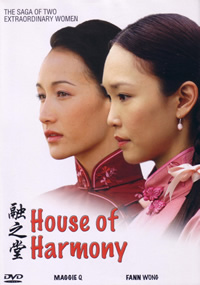SYNOPSIS:
The House of Harmony is a lavish adaptation of Barbara Woods'
best selling novel, set in the 1920s and 1950s between Singapore
and Los Angeles. This is a bittersweet story that spans over
three decades and two generations of love lost and found.
The courageous heroines triumph over aged old traditions,
racial prejudices and families' rejection and sacrifice everything
to be with the men they love. Their turbulent love stories,
ignites revenge, anger and betrayal until the sizzling climax
when family secrets are revealed and relationships tested.
Will the heroines finally be reunited with the men they love
and true love triumph?
MOVIE
REVIEW
More
often than not, when novels are adapted into features, the
results are disastrous. When the story deals with epic themes
which span over two generations, there is definitely a certain
level of difficulty of doing it right. Unfortunately, this
German-Singapore co-production of Barbara Woods’ best-selling
novel adaptation of the same name does not fare too well with
us too. Everything in it seems so wrong, it is going to be
hard finding something to like about it.
Set
in the 1920s and 1950s between Singapore and Los Angeles,
the story begins with a certain Singaporean pianist (played
by the luminous Fann Wong), who goes against traditional Asian
values, follows her dreams and falls in love with a foreigner.
Like
a true love tragedy, the happy couple does not live happily
ever after. They bear a daughter who grows up (and played
by the stunningly beautiful Maggie Q), only to follow her
mother’s footsteps.
The
synopsis may sound good on paper, but it is a real feat trying
to adapt it for the screen. First, any decent couch potato
will be able to expect what happens next as the plot develops.
Next, running at 180 minutes over two consecutive parts, the
viewing process may be exhausting to some. Hence, watching
this feature is just like trying to bear a very lengthy long
running series on your television screen.
The
next fatal flaw is the feature’s audio dubbing. All
the Caucasians speak in perfect Mandarin, which is very cringing
to hear. It feels like watching some late night repeats on
a boring weekday.
Sadly,
like most features nowadays, filmmakers try to hide their
fatal flaws with pretty visuals and nice-looking cast.
The
production value for this feature is high, with some lavish
cinematography and creative camera shots. The string score
is also apt, though over dramatized at times.
The
cast delivers television drama performances, which we do not
blame, given the feature’s nature. The first third is
a bit difficult to sit through, unfortunately caused by Fann
Wong’s portrayal of the stereotypical suffering maiden.
When it comes to Maggie Q’s segment, the pace picks
up and the feature becomes a tad more bearable. Other familiar
faces like Amy Cheng, Jason Chan, Zhu Houren and Jin Ying
Ji make the viewing experience more interesting.
If you really had to watch this, do split it up into episodes
ala a television drama series. Watch them over a few days
if you can. This will make you diss this unnecessary novel
adaptation a little less.
AUDIO/VISUAL:
The visual transfer justifies the eye-pleasing cinematography,
but somehow feels like what you always see on television.
There are audio options of Chinese Dolby 2.0 and Chinese Dolby
5.1, which cannot salvage the bad dubbing of the feature.
SPECIAL FEATURES
There
is a 24-minute “Making Of” documentary on this
two-part tele-movie. It features interviews with the various
personnel involved with the project. You know this spot is
obviously produced locally when it focuses on the fact that
the feature is filmed entirely in Singapore, and interviewees
include local producers and representatives from the Media
Development Authority.
MOVIE
RATING:
  
OVERALL
DVD RATING :
 
Review
by John Li
|

